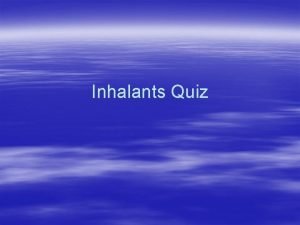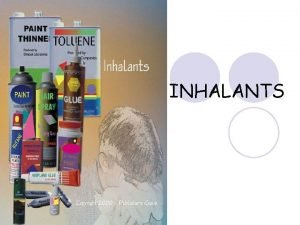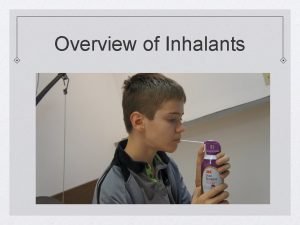Inhalants What are inhalants Inhalants are the vapors








- Slides: 8


Inhalants What are inhalants? Inhalants are the vapors that are inhaled to reach a quick high from liquids, sprays, gases, and nitrites. Of the more than 1, 000 household and other common products that can be used as inhalants, the most often abused are: shoe polish glue toluene- a colorless liquid used as a solvent and a fuel gasoline lighter fluid nitrous oxide- “whippets” – a colorless, sweet-smelling gas used as an anesthetic spray paint correction fluid cleaning fluid Street names Dust off, whippits, air blast, snappers, spray, poppers, shoot the breeze, pearls

How are inhalants used? Users inhale the chemical vapors directly from: • open containers (“sniffing”) or breathing the fumes • from rags soaked in chemicals (“huffing”) • spraying the substance directly in the nose or mouth • pouring the substance into their collar, sleeves, or cuffs and sniff them periodically • inhale fumes from substances inside a paper or plastic bag (“bagging”). How do inhalants affect the body? Inhalants starve the body of oxygen and force the heart to beat irregularly and more rapidly. Users can experience nausea and nosebleeds and lose their sense of hearing and smell. Chronic use can lead to muscle wasting and reduced muscle tone, and the poisonous chemicals gradually damage the lungs and the immune system. An inhalant user risks Sudden Sniffing Death Syndrome. Death can occur the first time or the 100 th time an inhalant is used.

Short-Term Effects Most inhalants effect the nervous system to produce mind-altering effects. Within seconds, the user experiences effects similar to those from alcohol. Some of the effects that may be experienced shortly after using an inhalant are: • Slurred speech • Drunk, dizzy or dazed appearance • Inability to coordinate movement • Hallucinations and delusions • Impaired judgment • Unconsciousness • Prolonged sniffing of chemicals can cause irregular and rapid heart beat and lead to heart failure and death within minutes • Death from suffocation can occur by replacing oxygen in the lungs with the chemical and then in the CNS so that breathing stops

Long Term Effects Continued use of inhalants can produce significant and sometimes permanent damage to the heart, lungs, liver and kidneys. Some of the long-term effects of inhalant use are: • Muscle weakness • Disorientation • Lack of coordination • Irritability • Depression • Memory impairment, diminished intelligence • Hearing loss • Bone marrow damage • Deaths from heart failure or asphyxiation (loss of oxygen)


Are Inhalants Addictive? Inhalants can be physically and psychologically addictive. People who use inhalants say they experience a strong urge to continue using. Those individuals who were regular users suffer from withdrawal symptoms which can include: • Nausea • Excessive sweating • Muscle cramps • Hallucinations • Headaches • Chills • Agitation • Shaking

Are Inhalants Legal? Inhalants are no regulated under the Controlled Substance Act but, 38 states in the US have placed restrictions on the sale and distribution to minors of certain products that are commonly used as inhalants.













